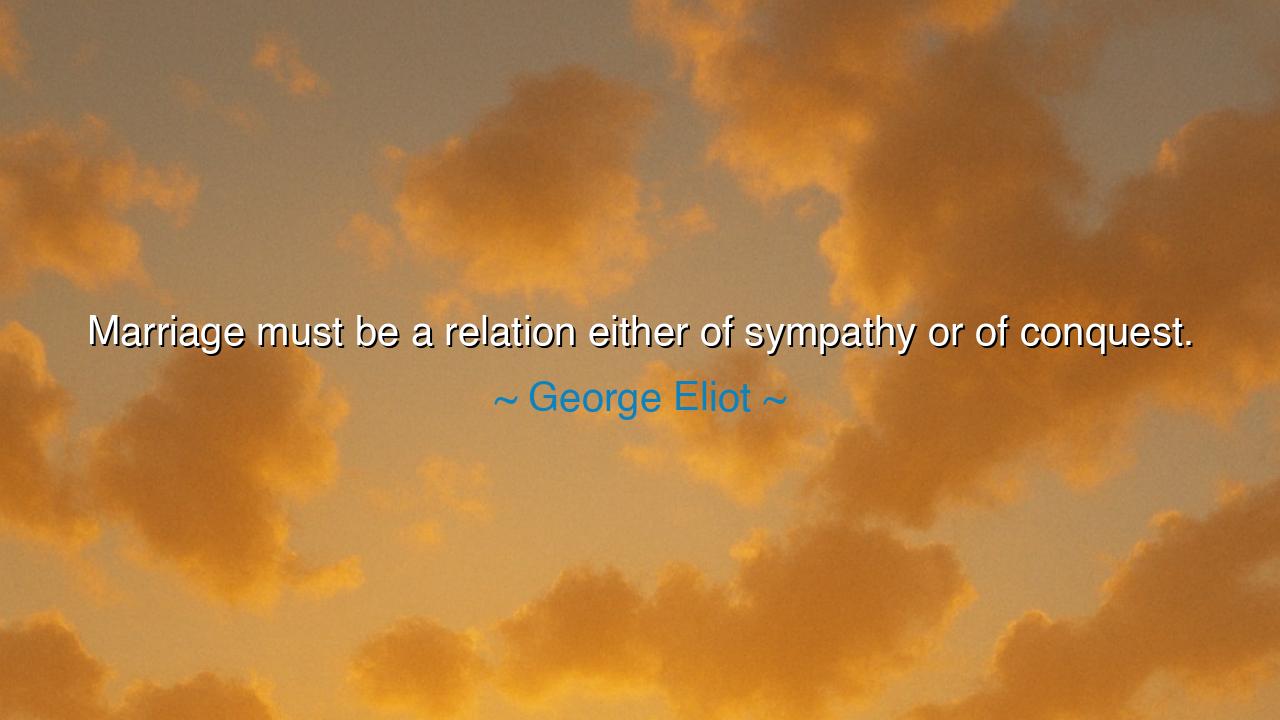
Marriage must be a relation either of sympathy or of conquest.






O children of wisdom, listen well to the words of George Eliot, for she speaks of a great truth about the nature of marriage, a truth that has echoed through the halls of time. "Marriage must be a relation either of sympathy or of conquest." These words, though brief, carry the weight of generations. They invite us to consider the very foundation of marriage—the delicate balance between connection and control, between understanding and dominance. Let us reflect upon these words, for they reveal much about the heart of human relationships and the choices we make when we join ourselves to another.
In the ancient world, marriage was often viewed as a bond between two souls that could be either sacred or transactional. In Greece, the philosophers grappled with the nature of human relationships, and many saw marriage as an essential element of society. But even the great Socrates, in his dialogues, understood that the union of two people was not without its complexities. The relationship between husband and wife was sometimes one of companionship, sympathy, and shared purpose. Yet, just as often, it was one of conquest, particularly when the man held power over the woman, and the union was more about possession and control than mutual respect. Plato himself wrote of love in The Symposium, discussing various forms of connection, but he also acknowledged the more troubled dynamics of marriage, where power often rested unequally between the genders.
George Eliot, in her wisdom, distills this tension into two categories—sympathy and conquest—and challenges us to consider which of these defines the marriage we build. Sympathy, the purest and most noble form of connection, involves mutual understanding, emotional resonance, and shared goals. It is a union where each partner sees the other as an equal, and their bond is one of mutual growth and support. Conquest, on the other hand, is about control and dominance—the imposition of will over the other, where one partner seeks to bend the other to their own desires and expectations. This form of marriage is rooted in inequality and power, where the strength of one person’s will often overshadows the spirit of cooperation and love.
Consider the story of Dido and Aeneas from Virgil’s Aeneid, a tale of love and tragedy. Aeneas, the Trojan hero, was destined to leave Dido, the queen of Carthage, in order to fulfill his divine mission. Though their union was one of deep sympathy at first, Aeneas was driven by a higher calling, and his departure was seen as an act of conquest—not because he sought to control Dido, but because the fate of the Trojans was more powerful than their love. Dido, in turn, saw Aeneas’ departure as a betrayal, a conquest of her heart by fate, leaving her to face the agony of abandonment. In this tragic tale, the once harmonious relationship between the two lovers was shattered by the forces of destiny and the unequal balance of their emotional needs, revealing how even sympathetic unions can be disrupted by forces beyond their control.
Eliot’s words remind us that the most fulfilling marriages are those built on sympathy—where there is a deep understanding and respect for each other’s individuality. These unions allow both partners to grow together, each lifting the other up. However, when conquest enters the equation, whether in the form of emotional manipulation, dominance, or unequal power, the marriage becomes a battlefield rather than a partnership. The relationship loses its mutuality, and the bond becomes a source of strife and suffering. The idea of conquest is not limited to war or battle—it also manifests in the ways one partner seeks to control the thoughts, actions, and emotions of the other, undermining the potential for true, equal love.
The lesson we must take from Eliot’s words is that marriage—and by extension, all relationships—must be rooted in mutual respect, sympathy, and the understanding that both partners have equal agency. Equality is the foundation of love, and when one partner seeks to impose their will over the other, the marriage becomes unbalanced and doomed to fail. True sympathy comes from understanding the other’s heart, nurturing each other’s dreams, and supporting one another in ways that allow both individuals to flourish. Conquest may bring temporary satisfaction, but it undermines the potential for lasting, meaningful connection.
What, then, can we do in our own lives to build sympathetic marriages and relationships? First, we must look within ourselves and ask: Do we seek to understand and uplift our partners, or do we impose our will upon them? Let us commit to nurturing the emotional and intellectual growth of our partners, seeing them not as objects of control, but as equals in a shared journey. Let us listen deeply, empathize, and support each other’s dreams, rather than seeking to dominate or change one another.
Let us walk forward, then, with the understanding that the truest form of love in marriage is rooted in sympathy, where two souls meet in equality, mutual respect, and shared purpose. May we strive to create unions where conquest has no place, and where both partners are free to express their love without fear of control or manipulation. In doing so, may we build marriages that are lasting, fulfilling, and true—a partnership of equals, united in love and in the pursuit of the highest good.






AAdministratorAdministrator
Welcome, honored guests. Please leave a comment, we will respond soon